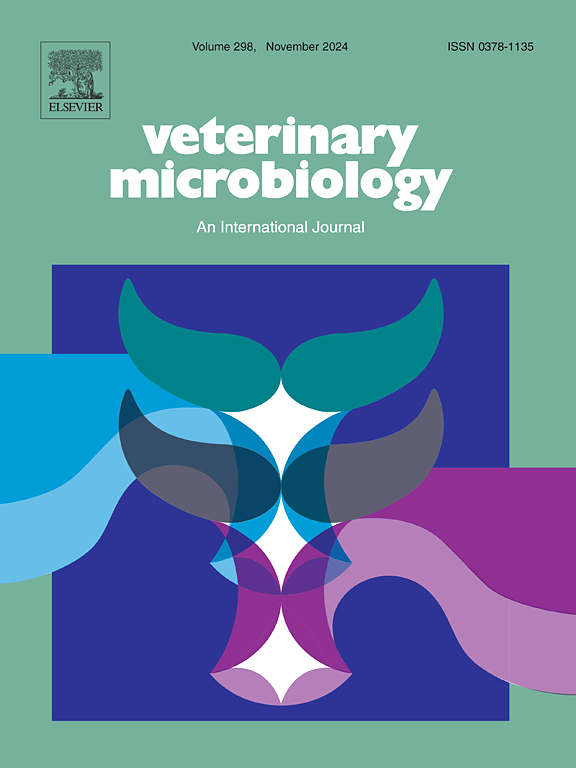编码非洲猪瘟病毒p54抗原的脂质纳米颗粒包裹DNA疫苗在猪体内引起强烈的免疫反应
IF 2.4
2区 农林科学
Q3 MICROBIOLOGY
引用次数: 0
摘要
非洲猪瘟病毒(ASFV)是影响全球养猪生产的最重要的病毒病原体之一。虽然一些非洲猪瘟减毒活疫苗已在某些国家批准临床应用,但人们担心疫苗病毒可能恢复毒性。含有一种或几种病毒免疫原的亚单位疫苗提供了一种更安全的选择。DNA质粒高度稳定,易于以低成本大量生产,并且用于动物是安全的。然而,未包封的DNA疫苗往往表现出低免疫原性,这主要是由于质粒DNA进入细胞的效率低下,导致蛋白质表达低。本研究以ASFV p54为模型抗原,探讨脂质纳米颗粒(LNP)作为纳米载体增强DNA疫苗免疫原性的可行性。经p54 LNP-DNA疫苗免疫的猪在第二次免疫后可产生高滴度的p54特异性抗体和t细胞应答。利用酶联免疫吸附法,基于重叠肽库,我们在p54中鉴定了三个抗原区域。此外,我们注意到接种p54 LNP-DNA疫苗的猪与接种实验性减毒活疫苗或感染野生型ASFV毒株的猪表现出相似的抗体谱。这些结果突出了LNP-DNA作为开发ASFV基因疫苗的有效平台的巨大潜力。本文章由计算机程序翻译,如有差异,请以英文原文为准。
Lipid nanoparticle-encapsulated DNA vaccine encoding African swine fever virus p54 antigen elicits robust immune responses in pigs
African swine fever virus (ASFV) is one of the most significant viral pathogens affecting swine production worldwide. While several live attenuated ASF vaccines have been approved for clinical application in certain countries, there is a concern that the vaccine viruses might revert to virulence. Subunit vaccines containing one or a few viral immunogens provide a safer alternative. DNA plasmids are highly stable, easy to produce in large quantities at low cost, and safe for use in animals. However, unencapsulated DNA vaccines often exhibited low immunogenicity, largely due to the inefficient cellular entry of the plasmid DNA, leading to low protein expression. In this study, we used ASFV p54 as a model antigen to investigate the feasibility of using lipid nanoparticles (LNP) as nanocarriers to enhance the immunogenicity of DNA vaccines. Pigs immunized with the p54 LNP-DNA vaccine elicited high titers of p54-specific antibodies and T-cell responses after the second immunization. Using ELISAs based on an overlapping peptide library, we identified three antigenic areas within p54. Additionally, we noted that pigs vaccinated with the p54 LNP-DNA vaccine exhibited a similar antibody profile as those vaccinated with an experimental live attenuated vaccine or infected with a wild-type ASFV strain. The results highlight the promising potential of LNP-DNA as an effective platform for developing gene-based vaccines against ASFV.
求助全文
通过发布文献求助,成功后即可免费获取论文全文。
去求助
来源期刊

Veterinary microbiology
农林科学-兽医学
CiteScore
5.90
自引率
6.10%
发文量
221
审稿时长
52 days
期刊介绍:
Veterinary Microbiology is concerned with microbial (bacterial, fungal, viral) diseases of domesticated vertebrate animals (livestock, companion animals, fur-bearing animals, game, poultry, fish) that supply food, other useful products or companionship. In addition, Microbial diseases of wild animals living in captivity, or as members of the feral fauna will also be considered if the infections are of interest because of their interrelation with humans (zoonoses) and/or domestic animals. Studies of antimicrobial resistance are also included, provided that the results represent a substantial advance in knowledge. Authors are strongly encouraged to read - prior to submission - the Editorials (''Scope or cope'' and ''Scope or cope II'') published previously in the journal. The Editors reserve the right to suggest submission to another journal for those papers which they feel would be more appropriate for consideration by that journal.
Original research papers of high quality and novelty on aspects of control, host response, molecular biology, pathogenesis, prevention, and treatment of microbial diseases of animals are published. Papers dealing primarily with immunology, epidemiology, molecular biology and antiviral or microbial agents will only be considered if they demonstrate a clear impact on a disease. Papers focusing solely on diagnostic techniques (such as another PCR protocol or ELISA) will not be published - focus should be on a microorganism and not on a particular technique. Papers only reporting microbial sequences, transcriptomics data, or proteomics data will not be considered unless the results represent a substantial advance in knowledge.
Drug trial papers will be considered if they have general application or significance. Papers on the identification of microorganisms will also be considered, but detailed taxonomic studies do not fall within the scope of the journal. Case reports will not be published, unless they have general application or contain novel aspects. Papers of geographically limited interest, which repeat what had been established elsewhere will not be considered. The readership of the journal is global.
 求助内容:
求助内容: 应助结果提醒方式:
应助结果提醒方式:


